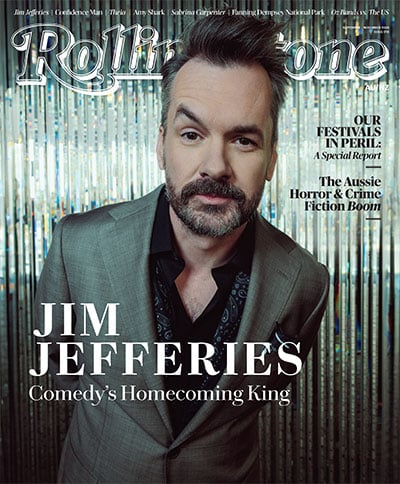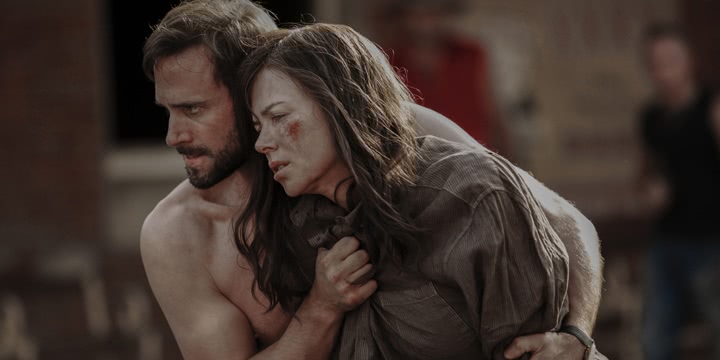At the media screening ofStrangerland, something altogether unusual occurred. Most film reviewers are a case-hardened sort, so attuned to anticipating the narrative shapes of cinema that engaging real emotion is a rare reward – yet as the credits rolled, not just one but two other journalists were reduced to tears by this superb, distressing debut. Director Kim Farrant has accomplished not only a beautiful (and troubling) film about familial grief, but has reached into the depths of her own experience to do so.
“When I was at Sundance for the world premiere, I saw it in a room that was half reviewers, press, buyers, and the other half family and friends,” Farrant recalls. “That was really fascinating, because I feel like the audience were kind of in a state of shock, not quite knowing how to deal with the uncomfortable place it had taken them. Then I watched the following six screenings at the festival – I mean, I didn’t work on it for 13 years not to attend the screenings – and it was so wonderful to sit in an audience with people who are crying, people who are gasping. People who were really unnerved and unearthed from it.
“I’d stick around and do the Q&A afterwards, and a lot of the feedback was along the lines of feeling very uncomfortable having watched the film, people reminded of how they acted out 40 years ago when their husband died and have never told anybody this before but they’ve been carrying around these years of shame … Very raw responses. For me, that was incredible. Some people love it, some people won’t, but that’s not really my business, in a way. What was really amazing was being in the room with people who are moved, who want to go and see their children afterwards, who want to go and express themselves where they haven’t been. And that’s part of the big intention of why we made it.”
Farrant speaks rapidly, clearly, but in almost stream-of-consciousness fashion; her thoughts run on each other’s heels, her sentences endlessly active. It is little surprise that she had the tenacity to pursue this project for over a decade; she is unmistakably driven, impassioned by the potential of this stirring story.
“As a filmmaker, you have to be crazy to some extent to spend years of your life often in a room by yourself. Writing proposals, writing scripts, on Skype, all of those emails to producers and writers around the world. I know I’m tenacious, and I believed in this project for a very long time, and it was hard to get it out of development because it was confronting and controversial, and people found that a challenge. But that’s not a reason to give up, and so I kept going, and finally it got green-lit. So I’m really glad I hung in there.”
That audiences might find the themes presented in Strangerland confronting is almost certain, yet never is the film gratuitous or trite. Instead, it addresses a very real, and for Farrant, very personal concern.
“I’m incredibly transparent onstage; I speak very openly about why I wanted to make this film. When my father died, when I was around 22, I was stricken with grief and felt incredibly helpless, like a lot of people when they lose a loved one. I’d moved to New York where I could grieve privately away from my family, and I found myself wanting to connect with people, and I didn’t know anyone, and I found myself wanting to be sexual.
“In retrospect, what the hell was going on? I was in such a vulnerable place and wanted to reach out to connect, and had a couple of encounters in the year that I was there and realised later that I was just desperate to feel some kind of connection that would bring me anything but the grief – that could temporarily make me feel like I was in control, that I could get my centre back again. But actually, connecting with a stranger was the last thing I needed. What I needed was a big cuddle, and for my dad to be alive again.
“So I spoke openly about those things, and I think for some people it was really refreshing to have that level of honesty, to be able to relate to the characters through the director in that way, which is what was driving me to make the film, which was also why I hung in there for so long. I knew we all act out differently in times of crisis, we all go into different behaviours or addictions as ways of coping, and sexuality in a time of grief is often something that isn’t spoken about, and happens behind closed doors and can lead to a lot of shame. So I wanted to help eradicate some of that shame by showing a true character, to give voice to the shame side of our psyche, the shadow side of sexuality in crisis.”
Strangerland is part of the Official Competition of Sydney Film Festival 2015. Playing at State Theatre Friday June 5 and Saturday June 6, and Casula Powerhouse Arts Centre and Hayden Orpheum Picture Palace Cremorne on Saturday June 6.


































